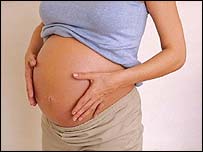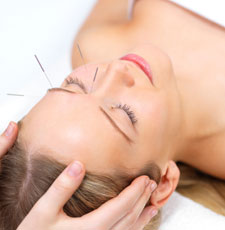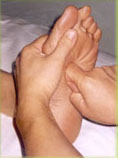BBC News, Friday, 18 March, 2005
Acupuncture is effective at relieving pelvic pain during pregnancy, a study says.
Pelvic girdle pain is common among pregnant women with one in three affected suffering severe pain. Researchers found acupuncture was better at easing the pain than standard and specialised exercising.
The team from Gothenburg’s Institute for the Health of Women and Children said the medical profession should be more open to using acupuncture. Read more »
Infertility:

infertility acupuncture
Infertility is when a couple fails to conceive (get pregnant) despite having regular unprotected sex. Although one in seven couples has difficulty conceiving, the number of couples who are actually infertile is relatively low. Read more »
How does it work?

acupuncture face lifting
In Chinese Medicine view, a person’s face is affected selectively by his or her internal organs. Facial features reflect organic strengths. As internal organs are fine-tuned by acupuncture, one’s face reflects the improvement. Beside addressing problems holistically, the acupuncturist will also apply treatment locally, inserting ultra-fine needles into–and around–specific wrinkles, acu-points or muscle points, depending on the technique employed.
The stimulation brings blood rushing to the face, which makes it look flushed. Apparently, after a few sessions, eyes brighten, skin feels firmer, lips become plumper and blemishes vanish.
Today, Facial acupuncture is the Hollywood star’s shortcut to younger looking skin. Precious Williams tries it. Please view this article from Telegraph on more information: view document »
We will make diagnosis for each individual patient and come up with different treatments according to the specific condition. Therefore, patients need to ring us to book an appointment for a free initial consultation first before starting a treatment.
Please Contact us if you need a free consultation.

 Traditional Chinese medicine (TCM) dates back to before the 21st century BC. With over thousands of years of practice and development, Chinese medicine possesses a unique and integrated theory. It is a complete medicine system. More and more research of modern medicine proves that Chinese medicine has distinctive effects on most forms of ill heath.
Traditional Chinese medicine (TCM) dates back to before the 21st century BC. With over thousands of years of practice and development, Chinese medicine possesses a unique and integrated theory. It is a complete medicine system. More and more research of modern medicine proves that Chinese medicine has distinctive effects on most forms of ill heath.
There are many side effects caused by taking antibiotics, steroids, painkillers and other synthetic chemical drugs for long period or at high dosage. Today, people are looking for an alternative way to get fit and healthy. More and more people in Western countries use and prefer Chinese medicine. It is estimated that a quarter of the world’s population currently use Chinese medicine all around the world. In the United Kingdom, Chinese medicine has become the most popular complementary medicine. Almost half the population, 47% of those surveyed, have used or would consider the use of complementary medicine. According to the recent news on TV and radio, the NHS is now considering using Chinese medicine to help some problems: pain, Asthma, Eczema, etc. and to reduce the waiting list due to the shortage of doctors.
The Theory
The fundamental principle of Chinese medicine is that the human body is considered as a whole system.
Yin & Yang
The balance of Yin –Yang (life forces) in a human body is the basic condition of human health, and thus the imbalance of Yin and Yang by any means will result in ill health. The purpose of Chinese medicine treatments is to analyse all symptoms and experiences of patients while taking into account age, sex, life style, physical and emotional traits and as well as other aspects of an individual. An overall picture of the patient is then set up. The medical treatment is to re-balance Yin and Yang in human body rather than to just treat symptoms.
The medical materials of Chinese medicine are natural plants and minerals. Compared to chemical synthetic drugs, Chinese medicine is safer and has fewer side effects.
Today, a well-trained practitioner not only uses the traditional way of diagnosis, but is also able to use other approaches integrated with conventional western medicine.
Chinese medicine has three basic forms of treatment – Acupuncture, Chinese Herbal Therapy and Acupressure. Chinese medicine treats both acute and chronic conditions, and is suitable for all age groups from young babies to the elderly and even pregnant women.

Reflexology
Chinese reflexology is the massaging of areas on the feet that correspond to the organs of the body. By applying pressure to these areas it is possible to regulate the function of the organs, clear toxins from the body and prevent illnesses from developing
Chinese Herbal Therapy is an important treatment in Chinese medicine. It was largely unexplored outside China until this decade.

Chinese Herbal Medicine
There are over 400 Chinese herbs suitable for use in the United Kingdom as they have well-documented and understood functions. Chinese herbs are said to balance the Yin-Yang (life forces) to regulate internal organs and to enhance the immune system.
Much research, however, has shown that function groups of some herbal combinations have the same effects as chemical synthetic drugs, such as killing bacteria, restraining viruses, relieving fever, stopping pain, balancing the hormones, reducing glucose level in blood, etc.
Herbal treatment includes: dry herbs to be taken as tea, in tablet and capsule format as well as powders, creams and lotions for external use. With or without acupuncture, Chinese herbs can be powerful therapy.
The effectiveness of using Chinese medicine, however, depends heavily on the experience and qualifications of the practitioner and on his/her understanding of patient’s health conditions.
How does Acupuncture work?
What can Acupuncture treat?
What happens during an Acupuncture treatment?
How many treatments are needed?
Self help
Acupuncture originated in China over 2000 years ago and is a healing system that has been used and developed since then in many parts of the world. It is currently used in hospitals throughout China and is practised alongside Western medicine, both contributing equally to the provision of health care. The effectiveness of acupuncture has been recognised by the World
Health Organisation for its success in the treatment of over 40 different diseases.
How does Acupuncture work?
Fundamental to Chinese Medicine is the concept of Qi, (Chi), something that has no Western equivalent but can be defined as vital energy or life force. The quality and amount of Qi determines ones health and vitality. It provides the source of movement in the body, keeps the blood circulating, fights disease and warms the body. Qi is distributed around the body through a network
of interconnecting channels which go deep to the organs and pass through different levels to just below the skin where it can be contacted with acupuncture needles.

In the body Qi is dispersed through twelve main interconnecting pathways. Illness occurs primarily when there is an excess, deficiency or stagnation of Qi either within a specific organ or channel. For example, a strained back may be due to blocked Qi in the Bladder channel which runs down either side of the spine. Similarly if the balance of Qi in the Stomach organ is disturbed either of the following may occur: vomiting will result if there is an excess of Qi, while deficiency of Qi over a long time may predispose to a stomach ulcer.
The aim of acupuncture is to correct imbalances of Qi through the insertion of needles into specific points along the channels and so assist the body’s own recuperative
powers.
What can Acupuncture treat?
Acupuncture is effective in treating most ailments presented at a GP’s surgery. It is especially valuable in chronic diseases that orthodox medicine can only alleviate with drugs. For example, asthma, hay fever, sinusitis; hypertension; depression; painful conditions anywhere in the body such as headache, migraine, arthritis, back pain; stiffness of joints or muscles.
Many acute complaints can be treated including strains and sprains, shingles, cystitis, menstrual disorders, diarrhea and vomiting, cough, colds and sore throats.
Acupuncture also recognises and treats many disharmonies that have no medical diagnosis, a non specific ‘not quite right’ feeling characterized by any of the following: tiredness, lethargy, vague aches and pains, digestive problems, difficulty in sleeping, anxiety, tension, palpitations or dizziness.
People with addictions to smoking, drugs or alcohol may be helped by acupuncture to reduce their dependencies.
In addition to the above many other disorders have been treated with success and it is always worth enquiring about any particular problem you might have. Please go to our Services page for more information.
What happens during an Acupuncture treatment?
In order to make a diagnosis and plan treatments your practitioner will need to take a detailed case history, asking about present and past health problems, lifestyle, and general health. You may discuss anything that you feel has an effect on your health. In Chinese Medicine it is helpful to have as much information as possible to give a picture of the disharmony.

pulse diagnosis
Careful examination of the pulse and tongue are also made. The rhythm and quality of the pulse is felt at the wrist which indicates the balance of energy and state of disease. The tongue, through its shape, colour, movement and coating indicates progression and degree of illness.
According to the diagnosis very fine needles are inserted into the acupuncture points. The initial sensation is often described as ‘tingling’, ‘slightly heavy’, ‘dull’, or ‘numb’. The needles are usually left in place for about twenty minutes, and the whole treatment last about an hour. (Stainless steel disposable needles are used).
After the treatment a feeling of relaxation or well-being is often noticed. It is not advisable to rush around doing anything too strenuous. After treatment sometimes tiredness may be felt for a couple of days afterwards while the energy adjusts. There may be an immediate improvement in the condition or sometimes an aggravation occurs before symptoms are alleviated. Usually a gradual improvement is noticed over a series of treatments.
How many treatments are needed?
Since acupuncture treats people not diseases the number of treatments necessary depends on a whole host of factors relating to the specific individual. For example, the duration of the illness, general state of energy, constitution, life style, are all taken into consideration. Generally speaking the more acute the disease the sooner it will respond, although there are instances where acupuncture has brought quick relief to many chronic problems.
The initial treatments will usually be once a week and their frequency will be decreased as the person progresses, to once a fortnight, once a month etc, until there is only a need for an occasional preventative check-up.
Self help

Vegitables & diet
As the cause of ill health can stem from our ways of living often some change in lifestyle may be needed to help the treatment to be effective. Your practitioner will help in giving an understanding of what may be contributing to illness in your particular circumstances.
The areas which influence health include: constitution, diet, exercise, type of work, relaxation, sleep, emotional states, weather conditions, drugs. etc.
There may be one or more of these aspects that needs special attention to prevent a recurrence of the particular disharmony.
My wife and I went to see a specialist at the hospital because we have been unsuccessful in trying for a baby and we found out the problem was with me.
I had a sperm count of around 3 million sperm per milliliter of semen, when 20 million or more is considered a normal count.
At the same time I was receiving treatment from Daian Zou for a knee injury that meant I could barely run properly and I mentioned that we were having difficulty trying for a baby.
Not only did Daian fix my knee so I can run for miles now, she prescribed a course of acupuncture, herbs and lifestyle advice that produced amazing results. Soon after starting treatment my sperm count went up to 5 million and now its well over the required 20 million which is enough for conception.
Search the site
Popular Pages
What Our Patients Say
- ~ ME problems improved – Sarah
"I have been seeing Daian for over two years now, for prolbems relating to MS. I have found her acupuncture treatments very helpful for numbness, balance and fatigue problems. Thanks so much for the"
- Read more testimonials »

 August 20, 2010 in
August 20, 2010 in 
